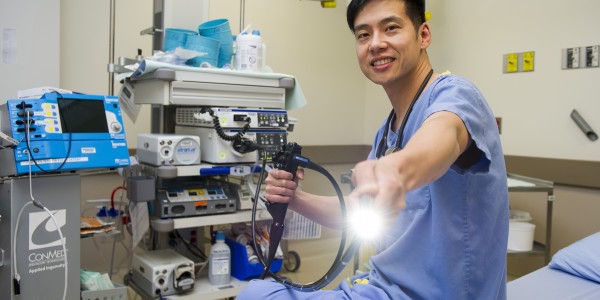Saving lives with early screening for colon cancer
‘Tummy troubles.” It’s a topic that can be embarrassing or unpleasant to discuss. But it’s important that we do.
Conditions and diseases that affect our digestive system such as inflammation, pain, bleeding, growths can be troublesome or worse, when it’s cancer, it’s life-threatening. But here’s some good news for adults in Richmond.
On Friday, August 17, Richmond Hospital will be expanding its colon cancer screening program to increase early screening, which is a high priority in our province. Deadly but very treatable if caught early on, colorectal cancer is the second leading cause of cancer death in Canada for both men and women, and the risk rises as we age, especially after 50.
With the expansion of the Richmond program comes the need for additional equipment and we are grateful to those who would donate to help us purchase new colonoscopes to meet the increased demand. It is a common belief that all medical equipment is paid for by government.
In this case, most of the new equipment will be funded by donations thanks to donors in the Richmond community.
We are fortunate to have a team of highly regarded, accomplished and very hard working gastrointestinal specialists who are able to provide nearly all procedures required right here at Richmond Hospital close to home.
One of the specialists is Dr. Victor Wong, who, along with his colleague, Dr. Martin Fishman, provides life-saving gastrointestinal procedures here at Richmond Hospital.
Approximately 90 percent of their practice is dedicated to colonoscopies to screen for colon cancer.
Dr. Wong received his degree from the Faculty of Medicine at UBC, completed a fellowship at the University of Western Ontario in London and returned home to begin his practice here.
As you will read, Dr. Wong has deep personal reasons for choosing his specialty:
“For me, it’s very personal and I have a connection to the disease. My father died of colon cancer, which is the main reason I decided to choose this field. It’s impacted me as a son, so I’m particularly empathetic towards the families where someone has colon cancer.
“There’s a five per cent lifetime chance of developing colon cancer. Anybody over the age of 50 should be screened for colon cancer. I think everyone should be knowledgeable about this disease and what to do to prevent it or catch it in its early stage.
“First you would take a test called the fecal immunochemical test (FIT) which detects blood in your stool, which can be a sign of pre-cancer. If no blood was found in the stool sample, the test is normal and no further action is necessary.
“If the stool sample contains blood, you will be recommended to go for a colonoscopy to use specialized equipment, a colonoscope, to see the inside lining of the rectum and colon. When we perform colonoscopies, we are hoping for earlier detection, and with earlier screening there are higher success rates and higher survival rates.
“Anyone who experiences a change in bowel habits, red blood or black stool, a family history of colon cancer, pain or weight loss, should be screened for colon cancer.
“When we do a colonoscopy, we are looking for polyps or tumours. Polyps are bumps in the colon that can potentially turn into cancer if they are left behind. If they are small enough, we can remove them endoscopically through the colonoscope. That way, we can avoid surgical intervention. That’s always the best option. If we are unable to do so here, the patient is referred to a general surgeon. Our goal is to find it early and remove it here in our clinic if possible.
“The procedure we perform is actually very safe and painless. Many are anxious, but when it’s done properly, people shouldn’t have pain,” says Dr. Wong.

